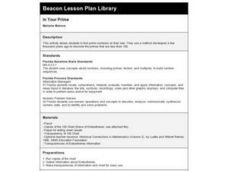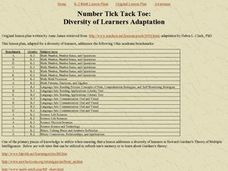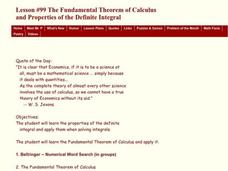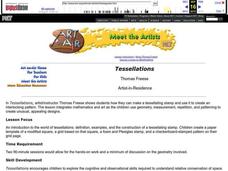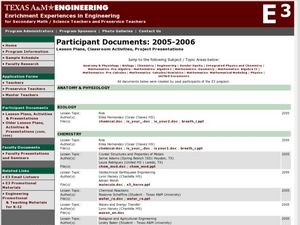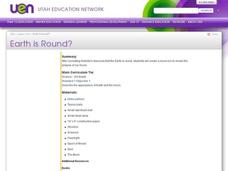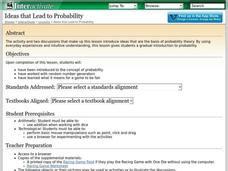Curated OER
In Your Prime
Students study how to find prime numbers. They investigate the teachings of the mathematician Eratosthenes and apply his theory of prime numbers less than 100.
Curated OER
Probability and Patterns with Pascal
In this Pascal worksheet, students solve word problems dealing with probability and patterns based on Pascal's triangle theory. Students complete 10 problems total.
Curated OER
Number Tick Tack Toe
Students participate in activities that apply Howard Gardner's theory of Multiple Intelligences in order to improve literacy skills. The lesson is ideal for diverse learners because of the application of the theory.
Curated OER
Number Properties - Know 'em, Like 'em, Use 'em
Ninth graders express mathematical properties through creation of advertising jingles.
Curated OER
Reflection of Light With Two Plane Mirrors- Double Mirrors Placed at a Number of Angles
Young scholars place two plane mirrors at different angles to experiment with reflection. They make kaleidoscopes and periscopes.
Curated OER
Super Science By Any Means Necessary!
The animated S2 Unit will use the adventures of a Super Hero and her sidekick to teach basic science and math concepts. Educators can use comic books, Saturday Morning Cartoons and the adventures of Super Heroes to teach a nine-week...
media.yurisnight.net
Science Lesson Plan: Our Solar System: I Wonder?
Ever wonder why Pluto isn't considered a planet? Or how large the Earth is compared to the other inner planets? Explore the universe with a series of projects that simulate different aspects of our solar system. The activities require...
Curated OER
Theoretical Quantum Physics... For Kids!
Students explore quantum physics by participating in several class activities. In this space-time lesson, students discuss the concepts of time traveling and the anatomy of an atom. Students draw geometric figures and utilize string to...
Curated OER
Creeping Sheets of Ice
Learners conduct scientific investigation in which they observe glacial
effects on landscape, develop and explain their own theories of how glaciers change land, and demonstrate understanding and explain basic motion and force principles.
Curated OER
The Fundamental Theorem of Calculus and Properties of the Definite Integral
Students discuss the importance of fundamental theorems in math. In this calculus lesson, students define the fundamental theorem of calculus and discuss why it is so important they understand it. They work problems to model how this...
Curated OER
Tessellations
Students learn and review basic geometric terms, definitions, and theory, including regular polygons, lines, angles, points, etc. They make a tessellating stamp and create a repeating work of art.
Curated OER
Analyzing Birds and Planes
Students find a variety of topics and subjects in this lesson. In the math section of this lesson, students graph linear equations and analyze their data. They solve one and two step equations to find the variable.
Curated OER
A Day to Remember!
Students study math. In this real-life problem solving lesson plan, students work on their skills dealing with time and money. They work in small groups on various time and money word problems and by the final day they have a final...
Curated OER
Relationship Between Addition and Subtraction
Students are taught how to add and subtract and use number sense to solve basic math problems. For this addition and subtraction lesson, students are being taught using theories from different philosophers in education. They are given a...
Curated OER
The Sum of Our Integer Intelligences
Students complete tasks. In this Seven Intelligences instructional activity, students complete a variety of activities that are all based on the seven different intelligences humans are supposed to possess based on Dr. Gardener's theory....
Curated OER
Ideas That Lead to Probability
Students explore and define the concept of probability. They utilize a random number generator to determine the fairness of a game. Internet and printable versions fo the activities are included.
Curated OER
THEMIS: A Magnetic Case of 'What Came First?'
In this magnetic reconnection activity, students solve seven problems using the data and graphs from the THEMIS satellite constellations, which show a series of events triggered by a magnetic reconnection. Students interpret the data in...
Curated OER
Black Holes-The Event Horizon
In this black hole activity, high schoolers read about the three parts to a black hole including the Event horizon, the interior space and the singularity. Students solve five problems which involve using a given formula for the...
Curated OER
Circle Theorem
In this geometry worksheet, students draw an illustration of a circle centered between two points. They draw three line segments. Students answer two questions about the resulting angles. A sample, interactive drawing is included with...
Curated OER
Pythagoreum Theorem
Students practice assessing how to apply the formulas for the area of parallelograms and triangles. They recount the contributions of Pythagoras and apply the theories of the Pythagorean theorem in a group project to calculate the...
Curated OER
It's the Law
Students explain various scientific laws used in SCUBA diving. In this theory based lesson, students examine and explain how temperature, density, and salinity relate to SCUBA diving using various scientific laws to engage their learning.
Curated OER
Earth is Round?
Third graders discuss how Aristotle concluded that the Earth was round. As a class, they review theories about the Earth's shape and describe how life on Earth would be different if it were flat. Individually, they make a moon book in...
Curated OER
Ideas that Lead to Probability
Students explore the concept of probability. For this probability lesson, students use random number generators to determine probabilities of events. Students discuss if certain probable events are fair. Students determine fair ways to...
Curated OER
Mass Measurement
Middle schoolers explore geometry by completing a physics activity on-line. In this mass measurement lesson, pupils define the terms mass, volume, and density and identify their relationship with each other. They complete an on-line...


